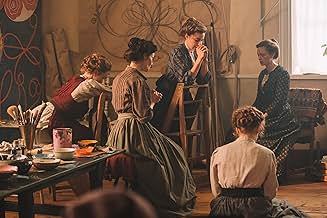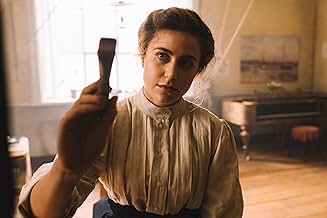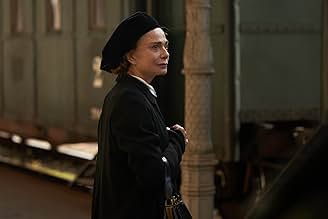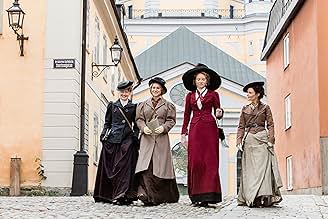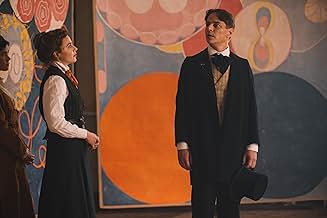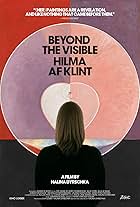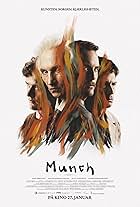Hilma
- 2022
- 2h
IMDb RATING
6.0/10
1.2K
YOUR RATING
Exploring Hilma af Klint's enigmatic life, now recognized as one of the Western world's first abstract artists.Exploring Hilma af Klint's enigmatic life, now recognized as one of the Western world's first abstract artists.Exploring Hilma af Klint's enigmatic life, now recognized as one of the Western world's first abstract artists.
- Awards
- 2 nominations total
- Director
- Writer
- All cast & crew
- Production, box office & more at IMDbPro
Featured reviews
10DeltaKat
Lasse Hallström has created yet another fantastic movie.
I watched this movie and was in awe, of the magical Hilma, of the way the movie is filmed and the magnificent cast.
As a spiritual person, an artist myself and someone that attended a Rudolf Steiner school it made a huge impression on me!
Hilma was indeed a gifted person, and I am happy to see this movie show her ability and art in such an artistic way.
It is sad how the biggest minds and artists in this world of ours have so often been misunderstood and not appreciated until after their death.
I for one am happy I have become aware of Hilma.
I really recommend anyone with an open mind and eager to learn to watch this movie.
It is mesmerizing,
I watched this movie and was in awe, of the magical Hilma, of the way the movie is filmed and the magnificent cast.
As a spiritual person, an artist myself and someone that attended a Rudolf Steiner school it made a huge impression on me!
Hilma was indeed a gifted person, and I am happy to see this movie show her ability and art in such an artistic way.
It is sad how the biggest minds and artists in this world of ours have so often been misunderstood and not appreciated until after their death.
I for one am happy I have become aware of Hilma.
I really recommend anyone with an open mind and eager to learn to watch this movie.
It is mesmerizing,
...I just finished looking. It's a beautiful beautiful movie. It helps if you're spiritual and "get it" so to speak. What an extraordinary and interesting woman Hilda was. Wish I had known her. I'm happy I watched this movie cause it made me so happy seeing all the paintings I didn't know of. To know how she painted and to see her visions on the canvas gives me soul comfort. It's like "thank you for being on that path and put it out there for us with a brush and amazing colours!" I wish I could draw and paint and be in a creative group like Hilma and her amazingly talented friends. Thank you for this beautiful movie!
10jonwoodh
Before Kandinsky and Mondrian supposedly invented abstract painting there was an unknown Swedish artist, Hilma Klint, who began paining huge abstract works in the late 19th century. Hilma by Swedish director Lasse Hallström is a marvelous tribute to this amazing woman. Curious about the deeper mysteries of life from a young age, the film explores how she was drawn to the metaphysical world of spiritualism and embraced the works of Theosophy founder Helena Blavatsky, and particularly Anthroposophist Rudolf Steiner. These studies infused her paintings which were realized in a conservative, patriarchal time when only men were considered serious artists. Beautifully shot and superbly acted by Tora Hallström as the young Hilma and her real life mother, Lina Olin, as the older artist, the film is an essential introduction to a woman who only achieved fame after her death.
Is the life of Hilma af Klint this uninteresting or does Lasse Hallström fail to make this movie interesting?
The movie is slow and have few dramaturgy turns. A big disappointment.
It was very interesting to see mother and daughter act in the same movie thou. And some of the other actors did a solid work. But why not in swedish? It feels a bit weird to see swedes speak english. The only reason why must be to try to make the movie international but af Klint is probably to unknown to get a big spread.
Another part that brings down the ratings is the bad views of old Stockholm. It feels cheap and low budget.
You can do better, Lasse.
The movie is slow and have few dramaturgy turns. A big disappointment.
It was very interesting to see mother and daughter act in the same movie thou. And some of the other actors did a solid work. But why not in swedish? It feels a bit weird to see swedes speak english. The only reason why must be to try to make the movie international but af Klint is probably to unknown to get a big spread.
Another part that brings down the ratings is the bad views of old Stockholm. It feels cheap and low budget.
You can do better, Lasse.
What would I know about Hilma af Klint? Nothing. But one has to wonder how much any of us know about her. She was practically erased from art history for economical reasons for a long time, then brought back as a victory to feminism and artistic expression. She was also a really weird person and reports about her vary considerably to the point of total contradiction. So what would a conscientious movie production do about this? Well, create a very personal account from the viewpoint of Hilma, as if we knew everything about her.
This is also a Swedish film, but spoken in English, with a cast of Swedish, British, German and even Australian actors, with international social and economic interests connected to every bit of the film and ending with a really self-congratulatory visit to the New York Guggenheim. In other words, I may not know a lot about af Klint, but I am pretty sure this film was not about objective truth.
And if that was not enough, almost 20 minutes of the film's start is dedicated to showing how a smart female polymath was dismissed and held back by grobian men and the only love she could find was in a lesbian relationship. I watched this in a cinema and a lot of the couples there were all female. Nothing against that, but add some more agenda to the film, just for fun.
The positive is that most of the cast acted really well and the imagery was really beautiful. There were some era recordings remastered and then actors horribly composited over and the one static tramway car used repeatedly throughout the film, but let's put that on budget and technical constraints. Also, I can't say Tora Hallström played badly, but when the switch from young to old was made and Lena Olin came in to play af Klint, her acting skill overshone everything.
In fact, I would say that I was about to enjoy the film right about the end because of Lena Olin's work alone. Before that I absolutely hated Hilma's character: monomaniacal, egocentric, treating everybody like steps towards her spiritual goals. When Olin came on board I was shocked on how suddenly I was starting to like the character.
Anyway, there is a fine line between madness and genius and I guess it all depends from which side you are writing the script. In Hilma we are presented with a somewhat borderline personality, but the story is told from her perspective. As a result from "the five" that represented her gaggle of spiritual artists we only see her and her romantic partner, which she uses and discards with abandon anyway. Her visions and communications with the "High masters" is portrayed as truth that any elevated person should accept. All other people are seen as close minded, boorish, intellectually, spiritually and emotionally inferior to her. The deaths themselves: her sister, her father, her mother, her partner, her idol as presented in a way that show how self centered she was: traumatized by the loss of her sister, quickly accepting the death of her father, her mother dying off screen, her partner dying somewhere far and she again making a fantasy of communion with the dead and moving on, then again shocked by the death of an idol which she had imagined all her life to be her soulmate, but which in fact was just a dude minding his own business and being obnoxious.
Bottom line: the film was sometimes really beautiful and the cast competent. However the many agendas crammed into it spread it all over the place. Is it a film about art, about spiritism, about feminism, a personal biography or another exposé of a crazed self absorbed larger than life persona or a propaganda piece for the rewriting of art history according to modern sensibilities? All of the above. And unfortunately not a very good film overall.
This is also a Swedish film, but spoken in English, with a cast of Swedish, British, German and even Australian actors, with international social and economic interests connected to every bit of the film and ending with a really self-congratulatory visit to the New York Guggenheim. In other words, I may not know a lot about af Klint, but I am pretty sure this film was not about objective truth.
And if that was not enough, almost 20 minutes of the film's start is dedicated to showing how a smart female polymath was dismissed and held back by grobian men and the only love she could find was in a lesbian relationship. I watched this in a cinema and a lot of the couples there were all female. Nothing against that, but add some more agenda to the film, just for fun.
The positive is that most of the cast acted really well and the imagery was really beautiful. There were some era recordings remastered and then actors horribly composited over and the one static tramway car used repeatedly throughout the film, but let's put that on budget and technical constraints. Also, I can't say Tora Hallström played badly, but when the switch from young to old was made and Lena Olin came in to play af Klint, her acting skill overshone everything.
In fact, I would say that I was about to enjoy the film right about the end because of Lena Olin's work alone. Before that I absolutely hated Hilma's character: monomaniacal, egocentric, treating everybody like steps towards her spiritual goals. When Olin came on board I was shocked on how suddenly I was starting to like the character.
Anyway, there is a fine line between madness and genius and I guess it all depends from which side you are writing the script. In Hilma we are presented with a somewhat borderline personality, but the story is told from her perspective. As a result from "the five" that represented her gaggle of spiritual artists we only see her and her romantic partner, which she uses and discards with abandon anyway. Her visions and communications with the "High masters" is portrayed as truth that any elevated person should accept. All other people are seen as close minded, boorish, intellectually, spiritually and emotionally inferior to her. The deaths themselves: her sister, her father, her mother, her partner, her idol as presented in a way that show how self centered she was: traumatized by the loss of her sister, quickly accepting the death of her father, her mother dying off screen, her partner dying somewhere far and she again making a fantasy of communion with the dead and moving on, then again shocked by the death of an idol which she had imagined all her life to be her soulmate, but which in fact was just a dude minding his own business and being obnoxious.
Bottom line: the film was sometimes really beautiful and the cast competent. However the many agendas crammed into it spread it all over the place. Is it a film about art, about spiritism, about feminism, a personal biography or another exposé of a crazed self absorbed larger than life persona or a propaganda piece for the rewriting of art history according to modern sensibilities? All of the above. And unfortunately not a very good film overall.
Storyline
Did you know
- TriviaThe distinguished veteran film critic Michale Darvell in his annual round up of all the film released in UK, online or on television voted "Hilma" as the No2 Best Film of 2022. No1 was "Living".
- SoundtracksString Quartet No 3 in E Flat Major: II. Adagio Quasi Andante
Written by Franz Berwald
Performed by The Yggdrasil Quartet
- How long is Hilma?Powered by Alexa
Details
Box office
- Gross US & Canada
- $35,935
- Opening weekend US & Canada
- $5,727
- Apr 16, 2023
- Gross worldwide
- $768,256
- Runtime2 hours
- Color
Contribute to this page
Suggest an edit or add missing content

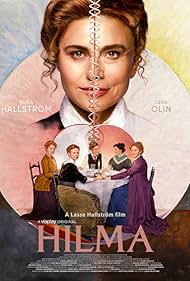

![Trailer [OV]](https://m.media-amazon.com/images/M/MV5BMjg5YWNkZDUtMmI0Zi00OGNiLTkzYmYtZDFlMDU1ZTlhNTliXkEyXkFqcGdeQXRyYW5zY29kZS13b3JrZmxvdw@@._V1_QL75_UX500_CR0,0,500,281_.jpg)
